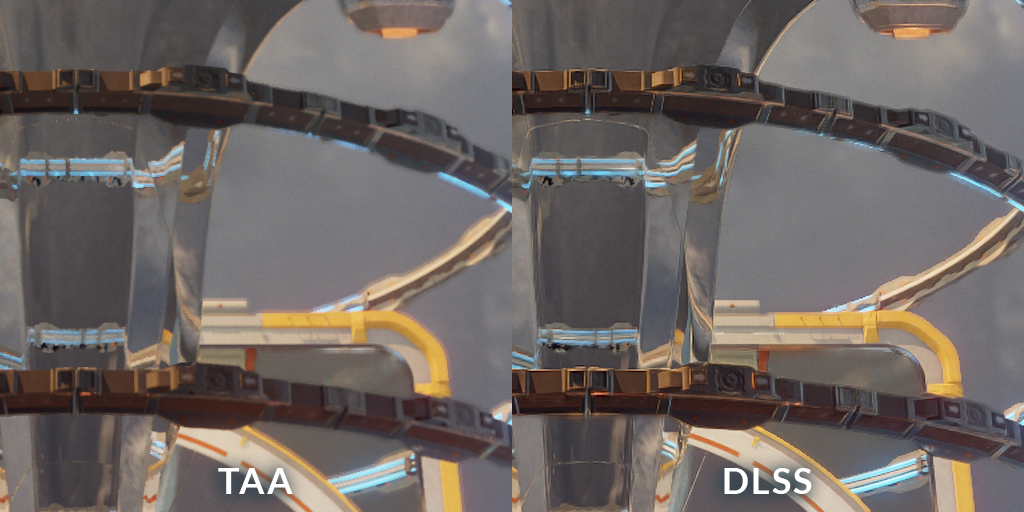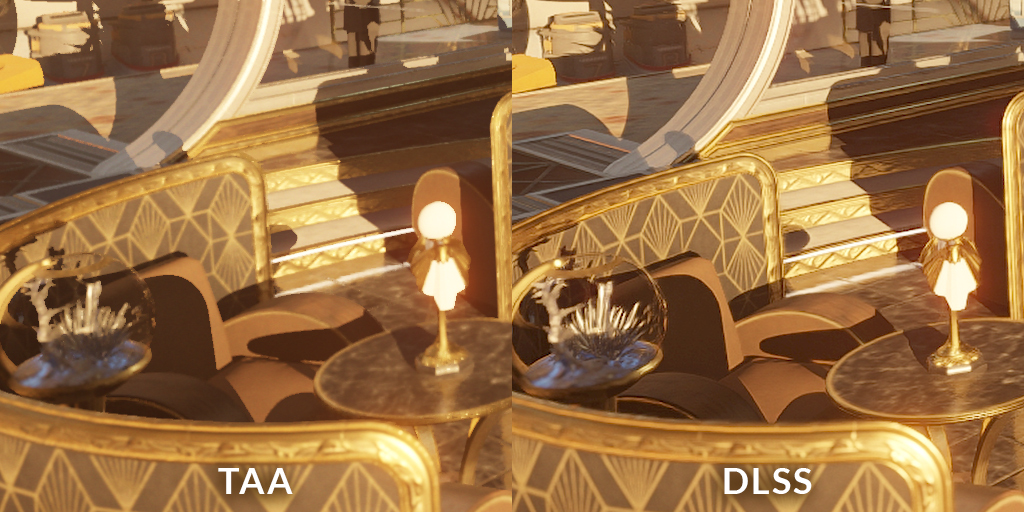3DMark adds DLSS performance test
February 4, 2019
Did you see the NVIDIA keynote presentation at CES this year? For us, one of the highlights was the DLSS demo based on our 3DMark Port Royal ray tracing benchmark.
Today, we're thrilled to announce that we've added this exciting new graphics technology to 3DMark in the form of a new NVIDIA DLSS feature test. This new test is available now in 3DMark Advanced and Professional Editions.
3DMark — NVIDIA DLSS feature test
3DMark feature tests are specialized tests for specific technologies. The NVIDIA DLSS feature test helps you compare performance and image quality with and without DLSS processing.
The test is based on the 3DMark Port Royal ray tracing benchmark. Like many games, Port Royal uses Temporal Anti-Aliasing. TAA is a popular, state-of-the-art technique, but it can result in blurring and the loss of fine detail.
DLSS (Deep Learning Super Sampling) is an NVIDIA RTX technology that uses deep learning and AI to improve game performance while maintaining visual quality.
Check out the video above and the images below to see a comparison of TAA and DLSS in the new 3DMark feature test.
Comparing performance with the NVIDIA DLSS feature test
The NVIDIA DLSS feature test runs in two passes. The first pass renders Port Royal with DLSS disabled to measure baseline performance. The second pass renders Port Royal at a lower resolution then uses DLSS processing to create frames at the output resolution. The result screen reports the frame rate for each run.
DLSS is a proprietary NVIDIA technology, so naturally, you must have an NVIDIA graphics card that supports DLSS, such as a GeForce RTX series, Quadro RTX series or TITAN RTX, to run the test. You must also have the latest NVIDIA drivers for your graphics card. You can find more details in the 3DMark technical guide.
About DLSS
DLSS uses a pre-trained neural network to find jagged, aliased edges in an image and then adjust the colors of the affected pixels to create smoother edges and improved image quality. The result is a clear, crisp image with quality similar to traditional rendering but with higher performance.
You can read more about DLSS and what it means for game developers on the NVIDIA website.
3DMark is 85% off in the Steam Lunar Sale
We're celebrating Chinese New Year—and the sixth anniversary of 3DMark's original release—with a special week-long sale.
From now until February 11, 3DMark Advanced Edition is 85% off, only USD $4.49, from Steam and our website.
3DMark Advanced Edition owners who purchased 3DMark before January 8, 2019 will need to buy the Port Royal upgrade DLC to unlock the DLSS test. The upgrade costs USD $2.99. You can find out more about 3DMark updates and upgrades here.
3DMark Professional Edition
The NVIDIA DLSS feature test is available as a free update for 3DMark Professional Edition customers with a valid annual license. Customers with an older, perpetual Professional Edition license will need to purchase an annual license to unlock Port Royal.
Recent news
-
Procyon® AI Benchmarks Provide Full Coverage and Actionable Performance Insights
January 13, 2026
-
Procyon Labs launches with FLUX.1 AI Image Generation Demo
November 4, 2025
-
3DMark Solar Bay Extreme is available now!
August 20, 2025
-
3DMark Speed Way Teams up with PC Building Simulator 2!
July 17, 2025
-
New Procyon AI Benchmark for Macs now available
June 25, 2025
-
3DMark for macOS available now!
June 12, 2025
-
New Inference Engines now available in Procyon
May 1, 2025
-
Try out NVIDIA DLSS 4 in 3DMark
January 30, 2025
-
Test LLM performance with the Procyon AI Text Generation Benchmark
December 9, 2024
-
New DirectStorage test available in 3DMark
December 4, 2024
-
New Opacity Micromap test now in 3DMark for Android
October 9, 2024
-
NPUs now supported by Procyon AI Image Generation
September 6, 2024
-
Test the latest version of Intel XeSS in 3DMark
September 3, 2024
-
Introducing the Procyon Battery Consumption Benchmark
June 6, 2024
-
3DMark Steel Nomad is out now!
May 21, 2024


